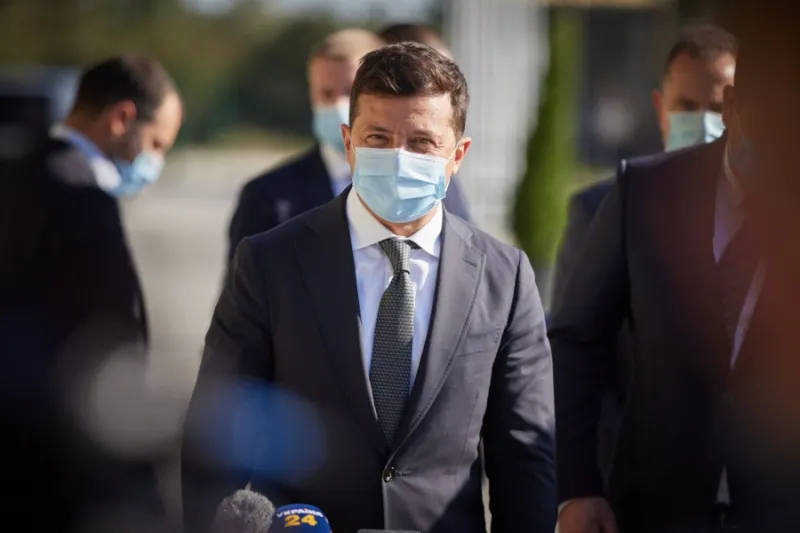
Rome Newsroom, Apr 30, 2021 / 12:00 pm (CNA).
Ukrainian president Volodymyr Zelensky said this week that the Vatican would be the “ideal place” for peace talks with Russian President Vladimir Putin.
“The Vatican would truly be the ideal place to dialogue on peace,” Zelensky told the Italian newspaper La Repubblica.
“The Holy See is a moral authority on a global level which has always effectively played the role of mediator because it is impartial and reliable for all parties in conflict.”
Tensions between Ukraine and Russia began to rise earlier this year with clashes in the Donbas region and a build-up of Russian troops close to the Ukrainian border.
Sergei Shoigu, the Russian foreign minister, said April 22 that some of the troops had been ordered to pull back from its border, and Russian media reported that Putin said Zelensky was welcome to come to Moscow “any time.”
In the April 28 interview, Zelensky underlined that the Holy See has often been called upon to mediate conflicts between states.
“The pope by his vocation is a prophet of peace. It is in this that the Vatican distinguishes itself from other international actors because it remains exclusively a moral power, it intervenes in a disinterested way without political-military or economic interests,” he said.
“A mediator with such authority could bring the confidence that has been lacking so far in our attempts to reach an agreement. Certainly, the meeting place should inspire confidence on both sides. Only then will this dialogue be effective and we can variously speak of substance.”
In response, Cardinal Leonardo Sandri, the prefect of the Vatican Congregation for the Oriental Churches, said on April 29 that the Holy See could provide support within the Minsk Group, founded in 1992 by the group now known as the Organization for Security and Co-operation in Europe (OSCE).
“There exists already the Minsk Group that is working on mediation,” the cardinal told La Repubblica the following day.
“I believe that eventual support from the Holy See can take place within that work.”
Sandri said that perhaps Pope Francis could make a “contribution, as he has already done in past situations. I am thinking, for example, of the meeting he had with al-Sistani in Iraq and other similar meetings.”
“In general, when help is asked to foster peace and reconciliation, the Holy See never backs down,” he added.
Major Archbishop Sviatoslav Shevchuk, the head of the Ukrainian Greek Catholic Church, told Aid to the Church in Need that Ukrainians were hoping that Pope Francis would visit their country.
He said: “Just as [the pope] recently visited Iraq, just as he will be going to visit different countries in the world in spite of the difficulties presented by COVID, so Ukraine is expecting the Holy Father to visit.”
The archbishop noted that Ukraine’s Prime Minister Denys Shmyhal invited Pope Francis to visit the country during a meeting at the Vatican in March.
“I recall how one old woman recently approached me to say, ‘When the Holy Father comes and touches Ukrainian soil, then the war will come to an end,’” Shevchuk said.
Ukraine and Russia have observed a fragile ceasefire since the 2015 Minsk II Accords. The conflict began after the November 2013 demonstrations, known as “Euromaidan”, against then Ukrainian President Víktor Yanukovych for his pro-Russian policies. The protests led to Yanukovych’s departure.
This was followed in 2014 by the annexation of the Crimean peninsula by Russia and the proclamation of independence of the cities of Donetsk and Luhansk in the Donbas region.
Archbishop Shevchuk told ACI Prensa, CNA’s Spanish-language news partner, that Catholics in Ukraine had been “praying incessantly for peace” since the conflict began and wanted the international community to be more involved in its resolution.
Pope Francis prayed for reconciliation between Ukraine and Russia in his Regina Coeli address on April 18.
“I follow with great concern the events in some areas of eastern Ukraine, where violations of the ceasefire have multiplied in recent months, and I observe with great concern the increase in military activities,” he said.
“I strongly hope an increase in tensions will be avoided, and, on the contrary, that gestures be made that are capable of promoting mutual trust and fostering reconciliation and peace, which are so much needed and so much desired.”
If you value the news and views Catholic World Report provides, please consider donating to support our efforts. Your contribution will help us continue to make CWR available to all readers worldwide for free, without a subscription. Thank you for your generosity!
Click here for more information on donating to CWR. Click here to sign up for our newsletter.




Leave a Reply